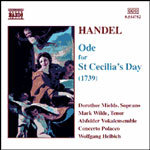
Ode for St. Cecilia's Day
 $25.00
Out of Stock
$25.00
Out of Stock6+ weeks add to cart
GEORG FRIDERIC HANDEL
Ode for St. Cecilia's Day
Dorothee Mield (soprano) Mark Wilde (tenor) / Alsfelder Vocal Ensemble / Concerto Polacco / Wolfgang Helbich, conductor
[ Naxos / CD ]
Release Date: Wednesday 2 June 2004
This item is currently out of stock. It may take 6 or more weeks to obtain from when you place your order as this is a specialist product.
Georg Friedrich Händel, later more generally known under the English forms of name that he assumed in London, George Frideric Handel, was born in Halle in 1685, the son of a successful barber-surgeon and his much younger, second wife. His father opposed his son's early musical ambitions and after his father's death Handel duly entered the University in Halle in 1702 as a student of law, as his father had insisted.
He was able to seize the chance of employment as organist at the Calvinist Cathedral the following month, holding the position for a year, until his departure for Hamburg, to work there at the opera, at first as a violinist and then as harpsichordist and composer, contributing in the latter capacity to the Italian operatic repertoire of the house. At the invitation of the son of the Medici Grand Duke of Tuscany, he travelled, in 1706, to Italy, where he won considerable success during the next four years. Connections he had made in Venice, brought appointment in 1710 as Kapellmeister to the Elector of Hanover. From here he was granted immediate leave to fulfil a commission in London.
Handel's first opera for London was Rinaldo, with which he won general acclaim, and after little over a year in Hanover again, he returned to England in the autumn of 1712. The following year he took up residence at Burlington House in Piccadilly as a guest of Lord Burlington. After a brief return to Germany in the summer of 1716, Handel returned to England, joining the establishment of James Brydges, Earl of Carnarvon and later Duke of Chandos, at Cannons, near Edgware. Principally, over the following years, Handel established himself as a composer of Italian opera, for which there was a fashionable audience, gradually achieving a dominant position in the musical life of the English capital. He enjoyed the royal patronage of George I, Elector of Hanover, who had succeeded to the English throne in 1715, on the death of Queen Anne, and on the death of the former in 1727 was commissioned to provide anthems for the coronation of George II. In the following years he was again called upon to provide music for royal occasions. At the same time his involvement with Italian opera brought increasing commercial difficulties, particularly after the establishment of a rival opera company in 1733 under the patronage of Frederick, Prince of Wales, himself later a strong supporter of Handel.
While Handel's work in Italian opera continued, with a final opera to be staged in 1741, he increasingly turned his attention to a new English form, that of the oratorio. This had certain very practical advantages, in language, lack of the need for expensive spectacle and the increasing employment of native singers. The content of oratorios appealed to English Protestant susceptibilities, providing a winning synthesis of religion and entertainment, and offering no offence to those who had found operatic conventions ridiculous in a city with strong pre-existent dramatic traditions. Handel's first English oratorio, in 1732, was Esther, with a libretto based on Racine, followed, in 1733, by the biblical Deborah in March and in July Athalia. During the following years he continued to develop the form, chiefly on biblical subjects but with an occasional excursion into the mythological. These works, with their Italianate melodies, strong choral writing and demonstrable dramatic sense, ensured their composer's continued popularity and dominance, particularly, after his death, with the wider development of choral singing in the nineteenth century.
Tracks:
Piano Sonata No. 11 in C, D. 612/163 (fragment)
Piano Sonata No. 12 in F minor, D. 625/505 (fragment) Piano Sonata No. 5 in A flat major, D. 557
Piano Sonata No. 7a in D flat major, D. 567 (incomplete)